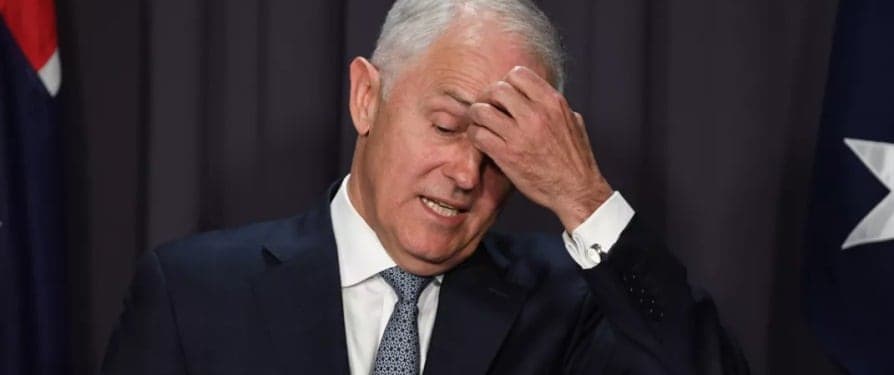The Turnbull government is trying to limit the damage from the citizenship crisis with a plan to have all MPs make declarations about their circumstances.
The motion, agreed to by cabinet on Monday, will be moved in the Senate next week and in the House of Representatives when it resumes late this month.
The move came as questions continued about the status of Energy Minister Josh Frydenberg, whose mother was born in Budapest but arrived in Australia stateless, and assistant minister Alex Hawke, born of a Greek mother.
Fairfax Media late Monday reported that Liberal backbencher John Alexander, who holds the New South Wales seat of Bennelong, might be a dual British citizen by descent because his father was born in the UK. It quoted a spokesman saying that Alexander “believes” his father renounced his British citizenship before Alexander was born.
Last week Senate President Stephen Parry quit parliament when he found he was a dual British citizen by descent.
Opposition Leader Bill Shorten – who proposed on Friday a universal disclosure by MPs which was dismissed by Turnbull – said he would meet with Turnbull on Wednesday to discuss the move. But Shorten said this was “a rather dramatic about-face” and questioned what was behind Turnbull’s change of heart.
Section 44 of the Constitution prohibits a dual citizen being eligible to sit in parliament.
Under the government’s plan, MPs will have to state within 21 days of the resolutions being passed in their respective houses:
- that when they nominated they were not, to the best of their “knowledge and belief”, a citizen of any other country, and that they are not currently a dual citizen;
- the place and date of their birth, and their citizenship at that time;
- the places and dates of their parents’ births; and
- whether the MP has ever been a citizen of another country, and if so, the details and evidence of the time and manner of the renunciation of that citizenship or how otherwise it ended.
Turnbull said the move was about transparency, confidence and standing up for the Constitution.
He stressed this would not be an “audit” – for which there have been widespread calls – because an audit would involve bringing in an outsider.
“The obligation to comply with the Constitution, in terms of being qualified to sit in the House or the Senate, is on the shoulders of each and every member and senator,” he told a news conference after the cabinet discussion. “That’s why this will be their declarations and their disclosures.”
The disclosure would be similar to those made by MPs about their pecuniary interests and they would be provided to the registrar of members’ interests. If anyone made a false statement they would be in contempt of parliament, with parliament able to impose penalties – although in practice penalties are not imposed for inaccuracies in statements of pecuniary interests.
Turnbull stressed that it is only the High Court that can adjudicate on citizenship status. If the declaration process threw up instances of dual citizenship, the House of Representatives or the Senate could refer the cases to the court.
“Members and senators have been put squarely on notice now, and so they will be turning their mind to their own affairs and the issues of … foreign citizenship,” Turnbull said.
He said in recent instances foreign citizenship had come about in two ways – citizenship by descent, as with Barnaby Joyce and Fiona Nash, and where somebody had been a citizen of another country and had not properly renounced that citizenship, as with Malcolm Roberts.
Turnbull said the Liberal federal director Andrew Hirst “has told me that all of the Liberal Party members believe that they are in compliance with the Constitution”.
Details about grandparents are not being required, although they are relevant to citizenship by descent.
Asked about their omission, Turnbull said it was a question of “remoteness and knowledge”.
“I think we may find that some members will have to do quite a bit of research to determine the place and date of birth of their parents, let alone their grandparents or potentially great-grandparents. It’s simply trying to get a balance between what is reasonably accessible and remote.”
He said some people “when they do due diligence might come to the conclusion that they are not eligible and they choose to resign”.
“On the other hand, the circumstances that are published may be of a nature that other members say, well, you may be believe you are eligible but I do not.” And then the latter member could move the case be referred to the court.
The declarations would also be made after an election.
Turnbull said there were many aspects of the recent decision by the court – which ruled five of the seven current or former MPs before it were ineligible when elected – that needed to be worked on for future elections.
“For example we have to consider whether people who nominate for parliament should not be obliged to provide information like this as part of the nomination process, even if only to make sure they turn their minds to it,” Turnbull said.
Turnbull foreshadowed that there could be further cases. “The court made its decision in the terms it did. It may give rise to more cases.”
“The High Court decision does create some real challenges because they have said that knowledge is not material. The fact is that very often people do not know.
“It may be that they do not know because it is very hard to know. Maybe they do not know because they have not thought about it,” Turnbull said.
Liberal backbencher Eric Abetz, who last week called for an audit, welcomed the “prime minister’s strong and decisive action to restore the integrity of the parliament”.
“I am confident that it will go a long way to ensure the parliament is seen to have integrity not only in the short term but well into the future,” Abetz said. “I am appreciative that the prime minister has taken on board the views of the backbench on this issue.”
Greens leader Richard Di Natale said Turnbull’s plan was “full of holes” and did “nothing to end the uncertainty”. The Greens would continue to press for an audit. There needed to be a “forensic look at the documentation” when there were questions about a person’s potential dual citizenship.
Australian Conservatives leader Cory Bernardi tweeted:
Is the 21 day citizenship disclosure requirement a way of avoiding Parl scrutiny this year? #auspol Surely can make it happen right now
— Cory Bernardi (@corybernardi) November 6, 2017
___________________________________________________
By Michelle Grattan, Professorial Fellow, University of Canberra
This article was originally published on The Conversation. Read the original article.
TOP IMAGE: (Lukas Coch/AAP/Original Article)








 Explore top-rated compensation lawyers in Brisbane! Offering expert legal help for your claim. Your victory is our priority!
Explore top-rated compensation lawyers in Brisbane! Offering expert legal help for your claim. Your victory is our priority! 

 "
"


